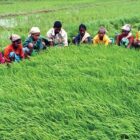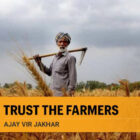The barrage of negative farm sector news highlights policy mess extenuating the imponderables around livelihoods in this space where even suicides are not correctly counted.
The powers that be have accepted neither the blame nor the responsibility for the barrage of negative news on the state of the Indian economy. The cracks are appearing on the facade though. In such tumultuous times, the finance minister began the pre-budget ritual of consultations. Having inherited a mess, she faces the challenge of very limited latitude for budgetary allocations. Her task is compounded by a bureaucratic decision-making process that is incapable of factoring the imponderables around actual livelihoods in an administrative framework where not even farm sector suicides are correctly enumerated.
The financialisation of policy-making has set us on an unforgiving trajectory where the corporate sector has wrung out a commitment from the government of spending Rs 102 lakh crore on infrastructure projects. It would have been wiser to prioritise investments in human capital. With around one per cent of this spend, the government could have filled all the vacancies and upgraded the ability of agriculture researchers, farm extension workers, teachers, doctors and similar professionals across India. There is a lot that those in power do not know, and they do not know that they do not know. This has culminated in a supply-side response to a demand slump, predicated on cutting corporate taxes instead of stimulating consumer demand by raising spending under MGNREGA or a one-time higher PM-Kisan dole out.
Since, it is equally important to augment government revenues, a beginning can be made by scrapping such schemes as the Pradhan Mantri Fasal Bima Yojna and saving over Rs 20,000 crore annually. The government would be better advised to go back to the drawing board in consultation with the farmers. Similarly, alcohol must also be brought under the ambit of GST at the highest tax slab. After states are compensated for forgoing their alcohol revenues, the central pool will benefit by an additional Rs 30,000 crore. It is also time to impose a tax on digital services and e-commerce companies rather than reduce PDS allocations to rein in the ballooning deficit as proposed by some economists.
Changed circumstances and new understanding requires innovative approaches to policy-making. The government must finance a long-term study for developing metrics for valuing farm ecosystem services whereby farmers are paid for their services of conserving the environment such that both the economic sustainability of the farmer and India’s food security are ensured. For instance, farmers can be paid for rainwater harvesting and upkeep of trees. The tricky part is to devise a differentiating metric for varying agro-ecology — a particular tree, for example, is valued differently in a rainforest and a desert. A systems approach is radically different from the present structure. Past experience indicates that it would be foolhardy to expect the Indian Council of Agriculture Research to develop one. Having perpetuated a kind of agricultural practice, it cannot be expected to purge itself. Rather than lose another two decades, it is advisable now to engage in a collaborative effort with a consortium of farmer organisations.
There are ambiguities that need to be resolved as well. The provision to levy income tax on “dairying”, for instance. The provision should either be removed or there should be a clarification that it does not include dairy farmers. Dairying is a part of agriculture and, as per the Constitution, it is a state subject. The Centre cannot levy income tax on dairy farmers. Removing such quirks will improve the ease of doing business. A simple notification to mandate a minimum purchase price of Rs 32 per litre for milk by institutional buyers will help regain some of the lost trust.
A suggestion that found considerable interest at the finance ministry’s meeting was on providing eggs sourced from backyard poultry for the mid-day meal scheme. Backyard poultry is about farmer families keeping chicken at home. The benefits will be multi-dimensional; protein for school children, no-leeway for adulteration, less food miles, families regaining self-esteem, developing community spirit and jobs in all six lakh villages across the country. The enabling factor is not eggs but the process of sourcing eggs from marginal, small and landless farmers. A competitive bidding process or allowing participation of commercial poultries will kill that very objective.
The finance minister had suggested extending the discussion to local sourcing of other products for mid-day meals. However, the current nutrition policy of India, increasingly influenced by commercial interests, is unlikely to enable it.




